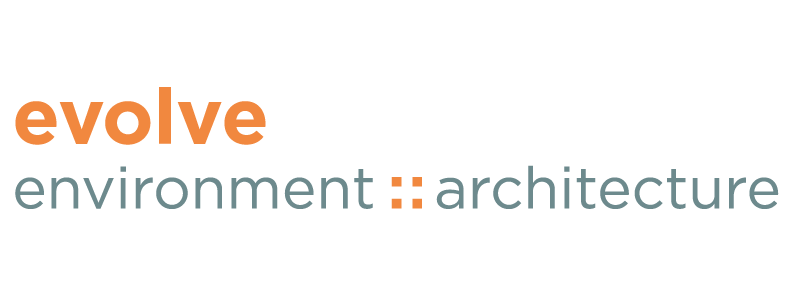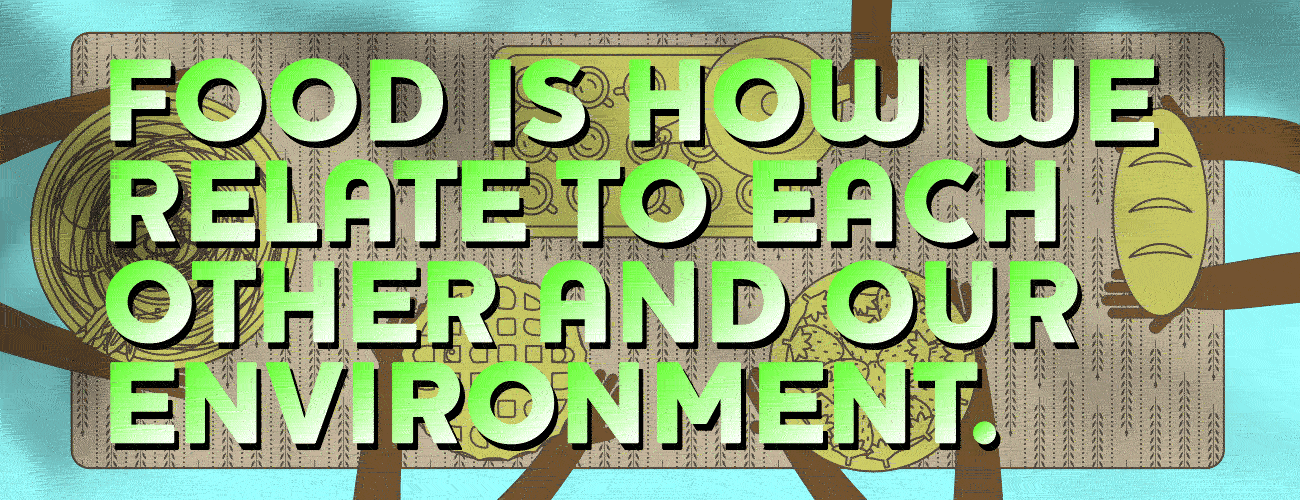Toward a Regional Food System Rooted in Justice
As Architects and Sustainability Experts, How are we working to Advance Equity and Justice in Regional Food Systems?
Food has a culture, a history, a story. Food is how we relate to each other and our environment.
Many of us take our food systems for granted and consider meals not only necessary, but also a highlight of our day. Individuals and communities suffer when people do not have access to healthy foods, and the USDA estimates that 33.8 million people in the US (over 10% the total population) experienced food insecurity in 2021.
We work with nonprofits who make sure that everyone is connected to healthy foods by strengthening the production, processing, and distribution systems that make our consumption possible. Two of these organizations, Grow Pittsburgh (GrowPGH) and the Greater Pittsburgh Community Food Bank (GPCFB), focus on improving regional food security as they increase their impact by integrating environmental performance into their core activities.
evolveEA is working with GrowPGH and the GPCFB as they expand their operations and their teams to decrease food insecurity and empower communities to understand food as a renewable resource and economic driver. Both organizations play a critical role in our food system: GrowPGH primarily as a leading driver of food production across Pittsburgh’s urban neighborhoods and adjacent communities, and GPCFB powers food distribution throughout the region to ensure universal access for all people.
With our help, both organizations have navigated previous growth opportunities by analyzing buildings and sites within regional and neighborhood-scale resource flows like food, energy, and water. This has enabled them to make treasured community places that better connect to local and regional needs. The proliferation of urban farms and of a culture of growing is the key to cultivating a closed-loop, sustainable food system and needs to be considered both as a site and a system.
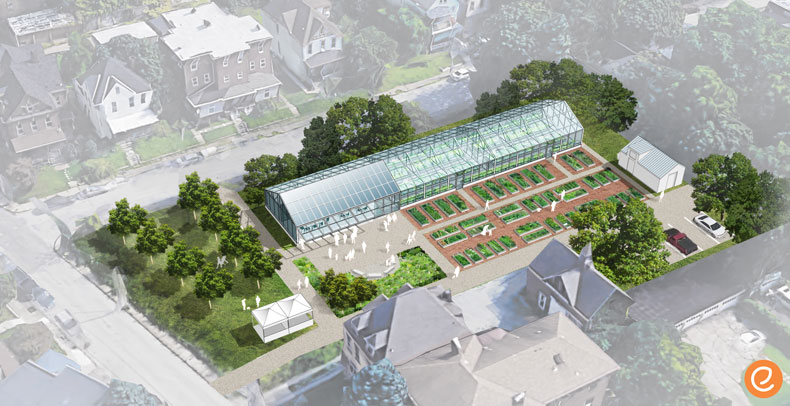
Vision for Grow Pittsburgh’s Garden Dreams site in Wilkinsburg
At Grow Pittsburgh’s Braddock and Wilkinsburg urban farms, we are designing greenhouses, gardens, and support facilities that invite the community to visit and volunteer to help GrowPGH produce more food. Drawing upon our experience in other local communities like Larimer and the Triboro Ecodistricts, evolveEA planned the sites and designed facilities that elevate community activities and local food-based entrepreneurship.
We asked Denele Hughson, Grow Pittsburgh’s Executive Director, to tell us about their work and the challenges they face in building a just food system. “There are multiple challenges,” she said. “One of the largest that we run into is both soil contamination and actual land access. Here in the city, a lot of our urban areas are facing development pressure. So we have community gardens that have been around for 20, 30 years that go defunct and they’re pushed out because of increased development pressure in certain communities. The way we address that is through a joint venture agreement with Allegheny Land Trust for Three Rivers Intercultural Land Initiative [3:57] which is a land bank program where we help save and protect community gardens in perpetuity…”
“We are a rust belt city so soil contamination is a really huge issue here. Making sure that there are safe spaces to grow, I think that’s always in the forefront of people’s minds. There is a lot of vacant land, but some of that land is not suitable to grow on.”
Grow Pittsburgh’s Board Chair, AnneMarie Toccket, told us that she is most proud of the organization’s investment in building facilities in underserved local communities—going beyond shorter-term programs. Reflecting on how the pandemic impacted their work, AnneMarie said, “We all see the value of food sovereignty and of food self-reliance more than we ever did before. I think your work on the Garden Dream Center in Wilkinsburg is just the most shining example of coming out of the pandemic stronger and with a new resource.”
At the GPCFB, we’re helping to ensure that the expansion and renovation of the Food Bank’s offices, warehouse, and operations center is ecologically designed and high performing so the nonprofit can focus on their core mission, getting more food to more people.
“Food rescue and sustainability are at the core of our operations at Greater Pittsburgh Community Food Bank,” said President and CEO Lisa Scales. “Last fiscal year, we rescued 13 million pounds of food later distributed to families in need. This effort is critical to making sure good food is utilized and not tossed into a landfill to spoil.”
We are continuing a 20 year relationship with the Food Bank—members of evolveEA designed the 130,000SF facility that became one of the first LEED Certified buildings in the country. evolveEA is working with a design team led by Pfaffmann + Associates to ensure that the current expansion is sustainably designed and maintains environmental sustainability as a core principle and guiding factor in all their work.
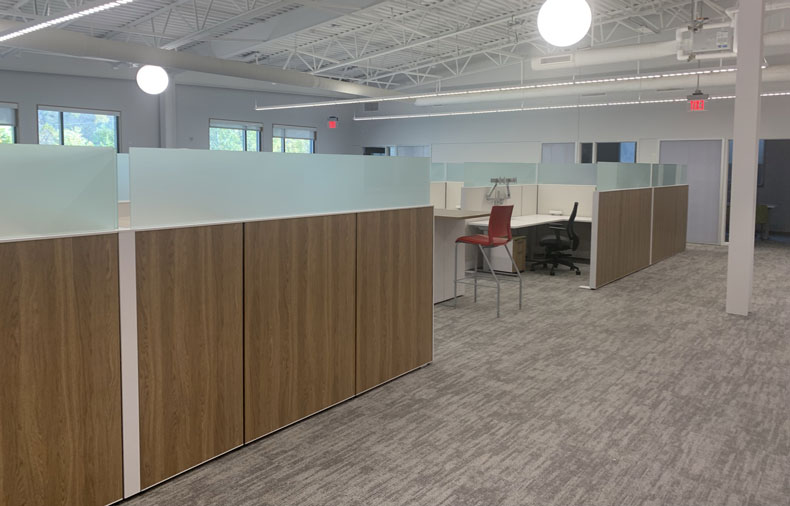
Renovated offices at the Food Bank (currently under construction)
The renovated GPCFB will serve as a Community Resiliency Hub, with the ability to serve surrounding areas with a variety of emergency services in times of crisis. Adding 30,000 SF of office space with updates to improve building performance will also create more cooler space to house fresh produce. Their goal is to make 50% of all the food distributed from the food bank fresh produce by 2025, which promotes good health and sustainable food production among other benefits. As part of the expansion project, the Food Bank worked with Iams Consulting to create a converter which captures the heat exhaust from food coolers and helps heat the building. They’re also using a biodigester that turns food waste into fertilizer for use at the organic Food Bank farm, in partnership with Ecotone Renewables.
Alongside our engagement in place-based projects, we have also provided organizational strategy consulting to these food-centric clients, and we’ve recently kicked-off strategic planning with Hilltop Urban Farm—the city’s largest urban farm. In past work with GrowPGH and GPCFB we helped establish their long-term visions, and develop strategies that would enable serving as many people as possible through sustainable growth.
We’re committed to a holistic approach to urban planning and city-wide sustainability solutions that integrates several of the 17 United Nations Sustainable Design Goals (UNSDGs). Our work supports the goals of both organizations and the broader regional food-focused network by striving to achieve Zero Hunger (UNSDG #2), No Poverty (UNSDG #1), Good Health & Well Being (UNSDG #3), and Reduced Inequalities (UNSDG #10).
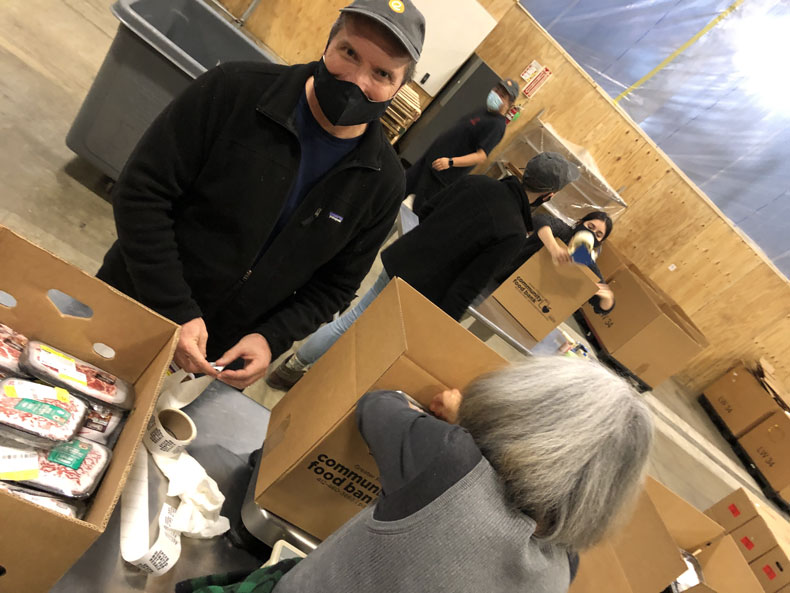
evolveEA team members volunteering at the Food Bank
Our engagement at the community level, with public agencies and infrastructure scaffolds the smaller scale places where we provide the technical expertise to meet targets and power a complex network. Food focused organizing is exponentially more effective when big-picture thinking informs all the operational decision making. That’s what has made the Food Bank and GrowPGH such powerful changemakers in promoting food justice and economic empowerment.

